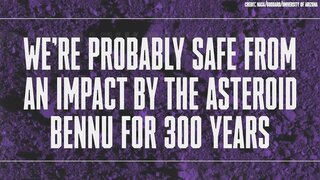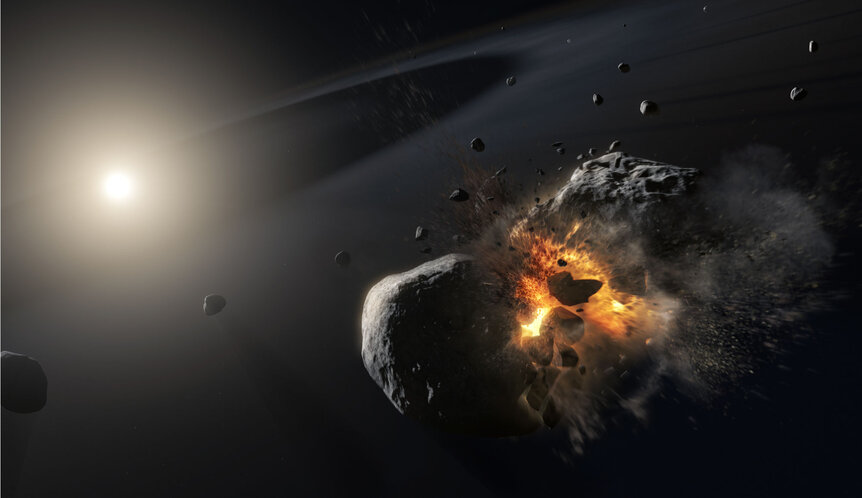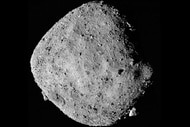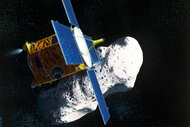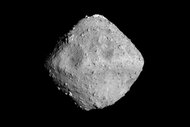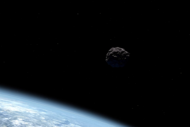Create a free profile to get unlimited access to exclusive videos, sweepstakes, and more!
Apophis Probably Isn't Coming to Earth in 2029, But What If It Gets Nudged by Another Asteroid?
Apophis has a couple of close passes scheduled, but it won't hit us.
Dodge Peterson (Steve Carell) works for an insurance company, he has a wife and a life, and all of it is about to be blown to smithereens by an asteroid 70 miles wide. There is, it turns out, no insurance policy to protect you against total annihilation in the 2012 film Seeking a Friend for the End of the World. It isn’t a movie about preventing the inevitable; it’s a story about finding yourself in adulthood and coming of middle age at the end of the world. It follows the end times adventures of Dodge and Penny (Keira Knightley), two people struggling to find meaning in the path of an oncoming asteroid.
The good news for those of us in the real world is that there aren’t any massive asteroids headed our way anytime soon. But asteroids do buzz our planet on a pretty regular basis. The “lost” asteroid 2007 FT3 has an incredibly small chance of hitting us in October of this year. The probability is vanishingly small and NASA has stated there are no known asteroid threats anytime in the next hundred years. The unknown threats are overwhelmingly small (they have to be to escape our notice) but they do sometimes sneak up on us.
On April 9, 2024, astronomers detected the previously unknown asteroid 2024 GJ2. Two days later, it passed by the Earth at a distance of only 12,000 miles, roughly 1/20 the distance from here to the Moon. Today, it’s headed back out toward deep space and it won’t get close to us again for another 70 years. In the meantime, astronomers have their eyes on the asteroid Apophis, an asteroid which has been threatening to hit us for 20 years.
For More on Apophis:
NASA Charts Mission to Apophis, the Near-Earth Asteroid Named for the Egyptian God of Chaos
The Asteroid Apophis Isn't Likely to Hit Earth. But if it Did, What Could We Do?
No, the Asteroid Apophis Still Won't Hit Us in 2036
Could Another Asteroid Nudge Apophis on a Collision Course with Earth?
Apophis was first discovered in 2004 and right away it was an object of interest. It’s about 1,100 feet across, not large enough to be a planet killer but large enough to deliver an incredibly bad day if it hit us. When astronomers first crunched the numbers on its potential orbit, they came back with a relatively high probability of impact. In the early days, the best anyone could say was they were about 97% sure it wasn’t going to hit us in April of 2029. That still left a 3% chance of impact, way too high for comfort.
With additional observations, astronomers were able to constrain the orbit of Apophis and determine it wouldn’t hit in 2029. Changes in the orbit after its close pass in 2029 will bring it back for another pass in 2036, but it won’t hit then either. Looking farther into the future, things become less clear. We’ve gotten pretty good at calculating orbits, but tiny variables stack up over time and uncertainty builds.
“Asteroid Apophis has fascinated us as a species since its discovery in 2004: it was the first credible threat from an asteroid to our planet. Even now that we know it’s on course to miss us by a safe margin, astronomers remain vigilant. It’s the asteroid we just can’t stop watching,” said Western University astronomer Paul Wiegert, in a statement.
In a new study, astronomers wanted to know what would happen if Apophis got nudged by another asteroid, and if such a collision might pose a risk to Earth down the line. The results have been posted to the preprint server arXiv and accepted for publication in The Planetary Science Journal.
“Given how closely Apophis will pass Earth, there is a possible risk that a deflection from its current trajectory may move Apophis closer to impacting us. Hypothetically, another asteroid colliding with Apophis could cause such a deflection, motivating us to study this scenario however unlikely it may be,” said University of Waterloo astronomer Benjamin Hyatt.
The team used computer modeling to calculate the motion of 1.3 million asteroids and determined that Apophis has a clear runway for the foreseeable future. “We calculated the paths of all known asteroids using a detailed computer simulation of our Solar System and the possibility of such an unlikely event was evaluated. Fortunately, no such collisions are anticipated,” Wiegert said.
If you're hoping for an asteroid apocalypse, you're going to have to stick to the movies. Seeking a Friend for the End of the World is available from Universal Pictures.
